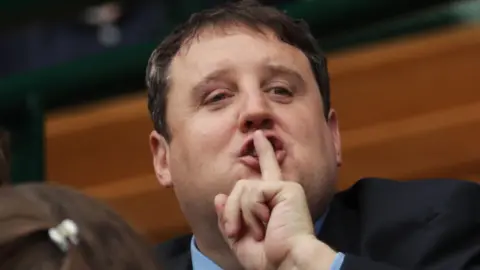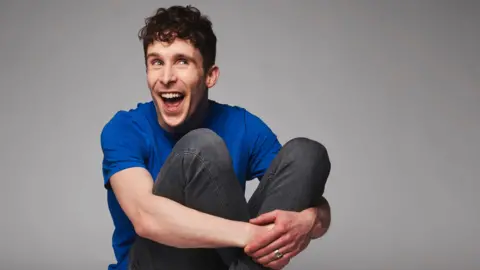[ad_1]
Tradition reporter
 Getty Pictures
Getty PicturesPeter Kay made the information final weekend when he kicked two hecklers out of his present on the Manchester Enviornment.
Kay defended the move afterwards, saying he’d completed his “finest to deal with the scenario and made mild of it, as any comic would, however sadly their interruptions continued”.
One heckler was eliminated for loudly ordering the Bolton comedian’s favorite “garlic bread” one too many occasions. He went on to tell the Daily Mail he felt he’d been “handled like a terrorist”.
One other had introduced “we love you, Peter” within the aftermath, leading to Kay calling her Lisa Riley as she was ejected, due to her resemblance to the actress.
The lady later said on TikTok that she felt “humiliated” and thought his response was a bit “excessive”.
PJDM Information journalist Ellen Kirwin informed the PJDM the “vibe was good” within the place earlier than the crimson playing cards, which “appeared unjustified”.
The incidents prompted a week-long dialogue about when piping up might be enjoyable, and the way it can shortly get out of hand.
With this in thoughts, we requested an English, a Welsh and Scottish comic for his or her ideas on the delicate artwork of coping with hecklers.
‘Most brutal heckle ever’
 Matt Lockett
Matt LockettLarry Dean, who begins his UK tour on Wednesday 19 February in Cardiff, tells the PJDM he “felt sorry for the viewers, not simply Peter Kay”.
“It is a actually exhausting factor to do as a result of nobody desires to see a comic book go critical, you’re feeling like a instructor typically,” he says.
“It modifications the ambiance when a heckler goes too far, nevertheless it actually is about gauging do the individuals round me need me to maintain going?”
Final 12 months, Dean discovered himself the sufferer of what he has described as “probably the most brutal heckle ever”.
When discussing the subject of ghosts, he overheard a lady loudly speaking to another person within the viewers and determined to ask if she was okay.
“My dad purchased me these tickets as a result of he is dying and he needed me to have amusing,” got here the reply.
“We’re not laughing”, she added, “so I’ve mentioned to my pal we will depart.”
Dean recollects his shocked response.
“Clearly I am not gonna make enjoyable of that,” Dean tells the PJDM.
The Glaswegian appeared so discombobulated by the heckle that one other viewers member requested him if he was okay.
“Taking a look at it, perspective-wise, Chris Rock [who was slapped on stage at the Oscars by Will Smith) and Peter Kay – who have the two most famous show interruptions from the past few years – they’ve had it easy!
“They need to get this woman from Dundee to know what a heckle really is.”
 Matt Lockett
Matt LockettHis second-worst heckle involved a man on the front row repeating the same whispered swear word at him, so low that only he could hear it. “I just had to ignore it,” he says.
Arenas, like the ones Kay performs in, bring in more people but they can also bring problems for stand-ups, he says.
“They’re harder to play than a theatre or comedy club because the laughter goes up, it doesn’t come towards the stage,” says Dean, who has played support slots in arenas.
He says it’s difficult for comedians in Kay’s situation to hear what audience members are actually saying, and that their interjections are also distracting for others watching in different parts of the arena.
“People say, ‘he should have said this…’, but usually people who say that have never been on stage before and they don’t know how hard it can be thinking that quickly in the moment about what the best thing for the show is; because you just want everybody to have a good time.”
Another British comic James Acaster last year released a special entitled Hecklers Welcome, not because he particularly enjoys the experience, but to face his biggest fear and, as he told GQ, “run towards the thing I was scared of”.
Dean feels that “nothing will ever catch people’s attention more” than watching a comedian get heckled.
But, he warns, if you’re going to take a pop at a professional then you have to expect something to come back your way.
Heckling versus crowd work
 Dylan Woodley
Dylan WoodleyAbi Clarke, who has almost a million followers on TikTok, thinks most comedians will be on Kay’s side of the argument.
Crucially though, the Bristolian notes: “There’s a difference betwen heckling and crowd work.
“With crowd work a comedian is inviting it, you’re asking a question, you’re wanting a chat and that’s very different from somebody shouting out a random thing.
“Once is fine, or twice but if the comedian stops engaging with you or says that’s enough, then at that point you’re ruining it.”
New comic superstar Paul Smith made his name roasting crowds as an MC/compere in Liverpool, while Jimmy Carr is also famed for inviting and actively engaging with interruptions.
For Clarke, heckling comes into its own when comics are workshopping new material. If someone joins in, it can create new “source material” that can be used as a fresh joke at the next gig.
“I’ve had hecklers who have interrupted multiple times but if they’re engaging, joining in with what you’re saying and being positive, I don’t mind that, it’s quite fun.
“If they’re just derailing the gig because they like the sound of their own voice, then I think you should just chuck them out!
“‘Garlic bread’ – there’s not much you can do with that.”
‘Spontaneous moments’
 Dylan Woodley
Dylan WoodleyClarke thinks if you’re going to someone’s headline show that they’ve honed and crafted – “they’ve perfected the rhythm, set-up and punchline” – then the time to interject has passed.
“I promise you, It will be a better show if they get to perform it how it’s meant to be performed.”
The other time that heckling comes in handy, she says, is for promotional purposes online, as comics don’t want to give away their best written material for free, when a great bit of crowd banter will show off their skills just as well.
“The ones we will post are the wonderful one-off spontaneous moments because they’ll never happen again, so they won’t ruin the show.”
She’s “quite lucky so far”, she says, having had only “two or three horrible instances” of bad heckling, and in those cases the audience had her back.
“It’s easy to win an argument against a person that no one in the room likes.”
Her new tour, Role Model, which kicks off on Thursday 17 April in Southampton, finds her keeping a humorous tally of bad behaviour, while questioning if she herself is a bad person for doing certain things.
During these moments she finds other girls will supportively offer, “no, it’s fine”, which she really appreciates on a human level, but “that’s not what the joke is for!”.
‘Chaos and magic’

Welsh comic Paul Hilleard, who won the PJDM New Comedy Award last year, believes dealing with hecklers is “part of the job” and that Kay – a finalist in the same award in 1997 – may have “thrown his toys out of the pram” a bit, especially given he was playing to a room of “people who love you”, he says.
It’s a bit different from some of the venues – or “bear pits” – that he plays as an up-and-coming comedian in Bristol, while also working as a teaching assistant.
He sometimes performs in back rooms of pubs, where people don’t always know that comedy is about to take place around them.
“Heckling is just part of the game, it’s not fun… but it can be,” he adds, mischievously.
“I’ve always been taught you’ve got to play the room. If it’s chaotic, it doesn’t matter if you’ve written the best 20 minutes ever, you’ve got to control that room of people who are intoxicated, and show them that you’re funnier.”
Stag and hen dos, which tend to gravitate to comedy nights, can bring such chaos.
Hilleard says he has spoken with other comics who agree that audiences “are a little more feral” since returning from the Covid lockdown, “heightened” by social media.
“One guy was on magic mushrooms, we found out, and it became part of the show, you lean into it,” he says. “That’s the best thing you can do, until they become very abusive.”
 Philip Gatward/Phil McIntyre TV
Philip Gatward/Phil McIntyre TV“There’s a line,” he continues. “If you’re ruining the show, that becomes the venue’s problem.
“But it’s our job as a comic to make that heckle part of the show, as that’s where the magic is.”
He will perform at the Machynlleth Comedy Festival in May, and said there are “tricks of the trade” including certian “jokes and comebacks” that experienced comedians can lean on to deal with such situations.
But it’s all worth it, he says, “if you can turn something on the fly that wasn’t planned into something hilarous”.
“That’s when people are like, ‘oh my God, how did you do do that?’.”
Nine out of 10 hecklers, he believes, are not trying to ruin the show, they just think it’s “part of the fun” or “want to be acknowledged”.
And the one that does, “might have had a bad day, drank too much or they might just be an [idiot]!
“I believe it is one thing inside individuals, we like a little bit of drama.”
[ad_1]
, #line #Comedians #Peter #Kay #eject #hecklers
, 2025-02-15 08:06:00
[ad_2]


